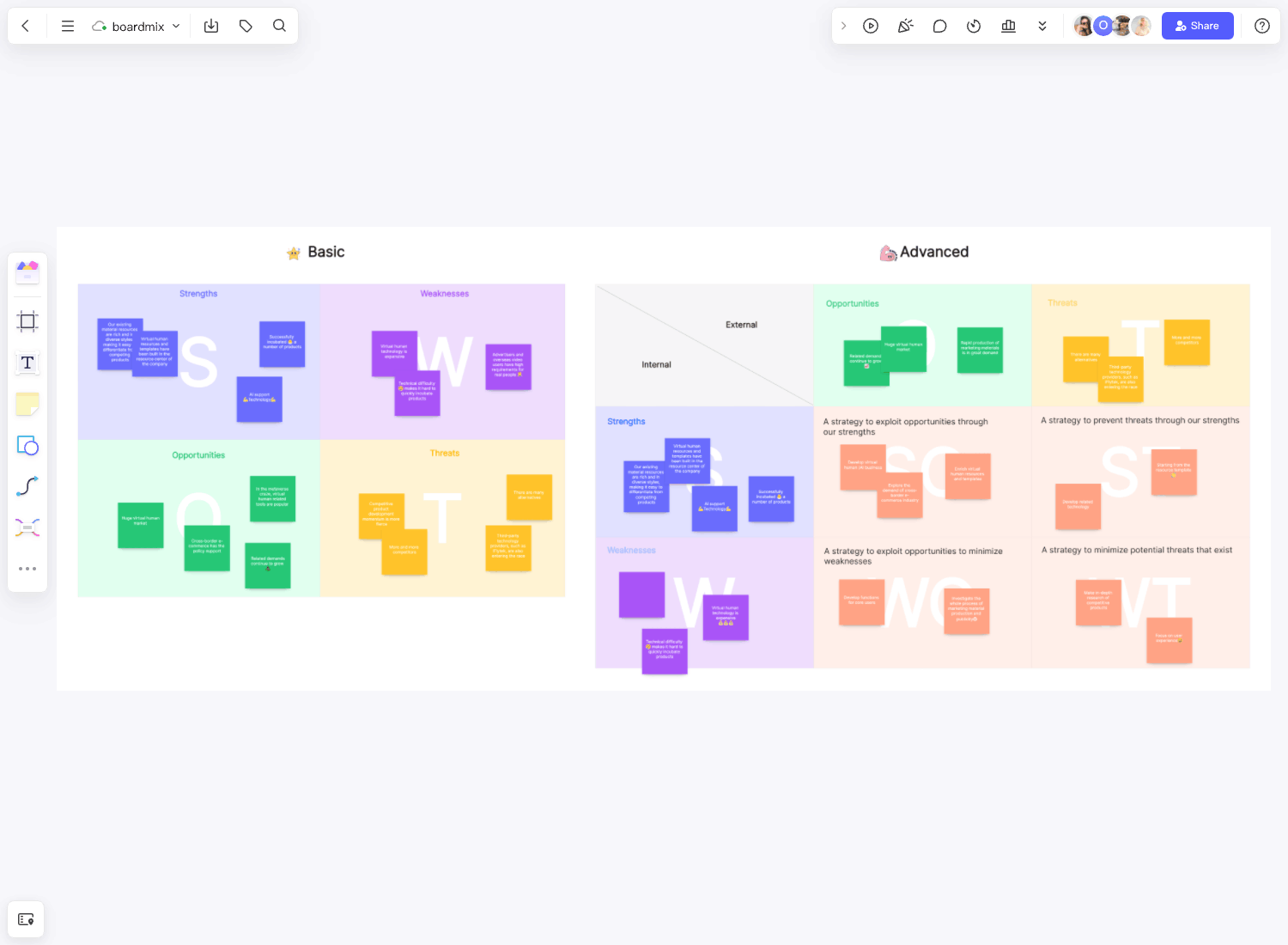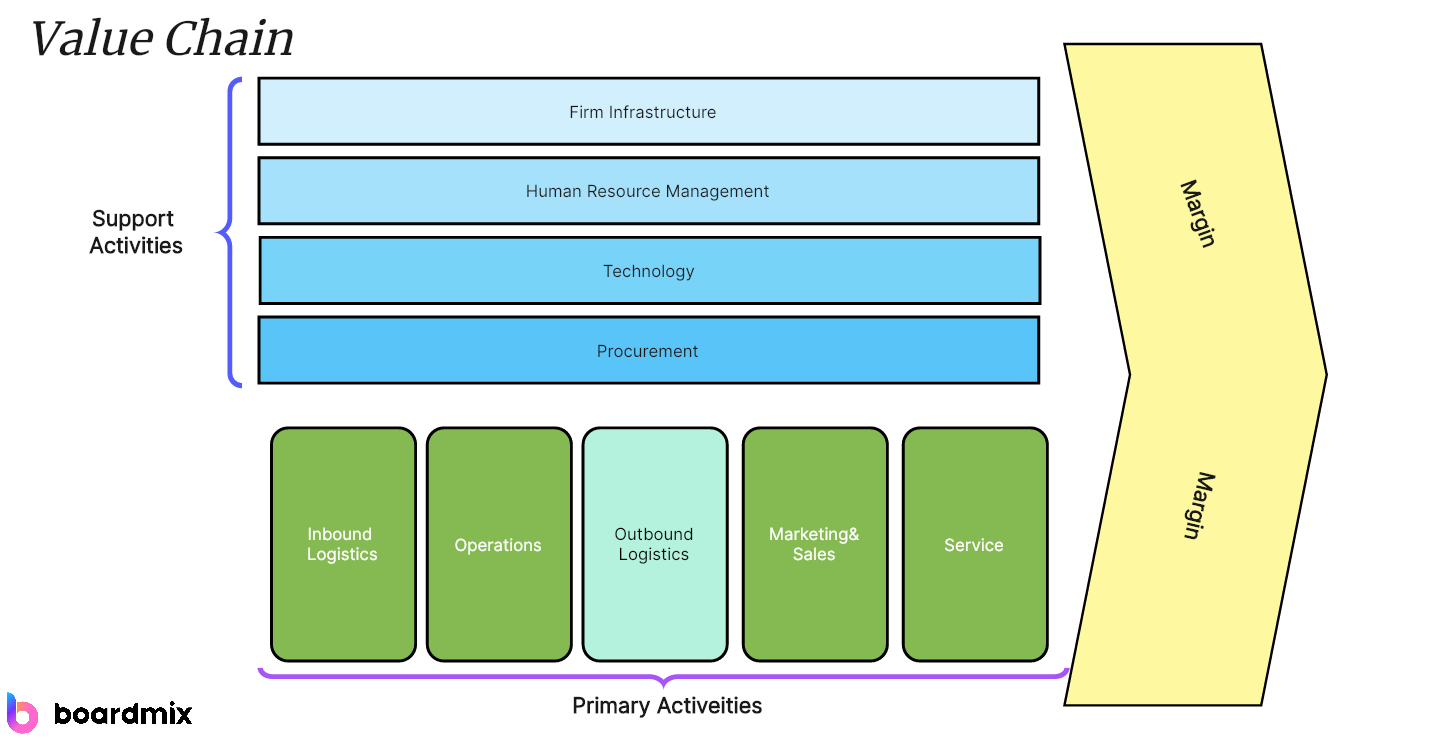Embarking on a journey through the dynamic landscapes of industries, our guide unveils the powerful strategic tool known as PESTLE analysis. Like a compass in the business world, PESTLE unravels the intricate threads of Political, Economic, Social, Technological, Legal, and Environmental influences.
As we navigate this strategic terrain, we'll dive deep into real-world PESTLE analysis examples from the food, automobile, retail, fashion, and smartphone industries, shedding light on the pivotal factors that shape their destinies.
Join us on this enlightening expedition, and discover how PESTLE analysis can be your guiding star in the realm of strategic decision-making!
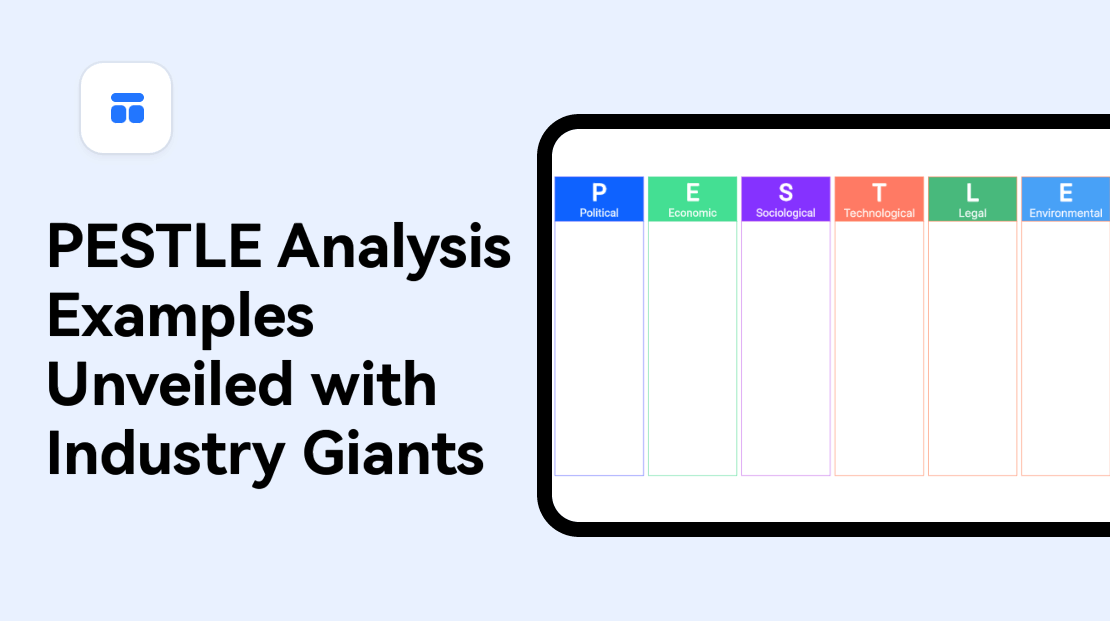
Start PESTLE Analysis for Free
What Is the PESTLE Analysis
In the ever-evolving landscape of business strategy, tools that offer comprehensive insights into the external factors impacting an organization's performance are invaluable. One such indispensable tool is the PESTLE analysis.
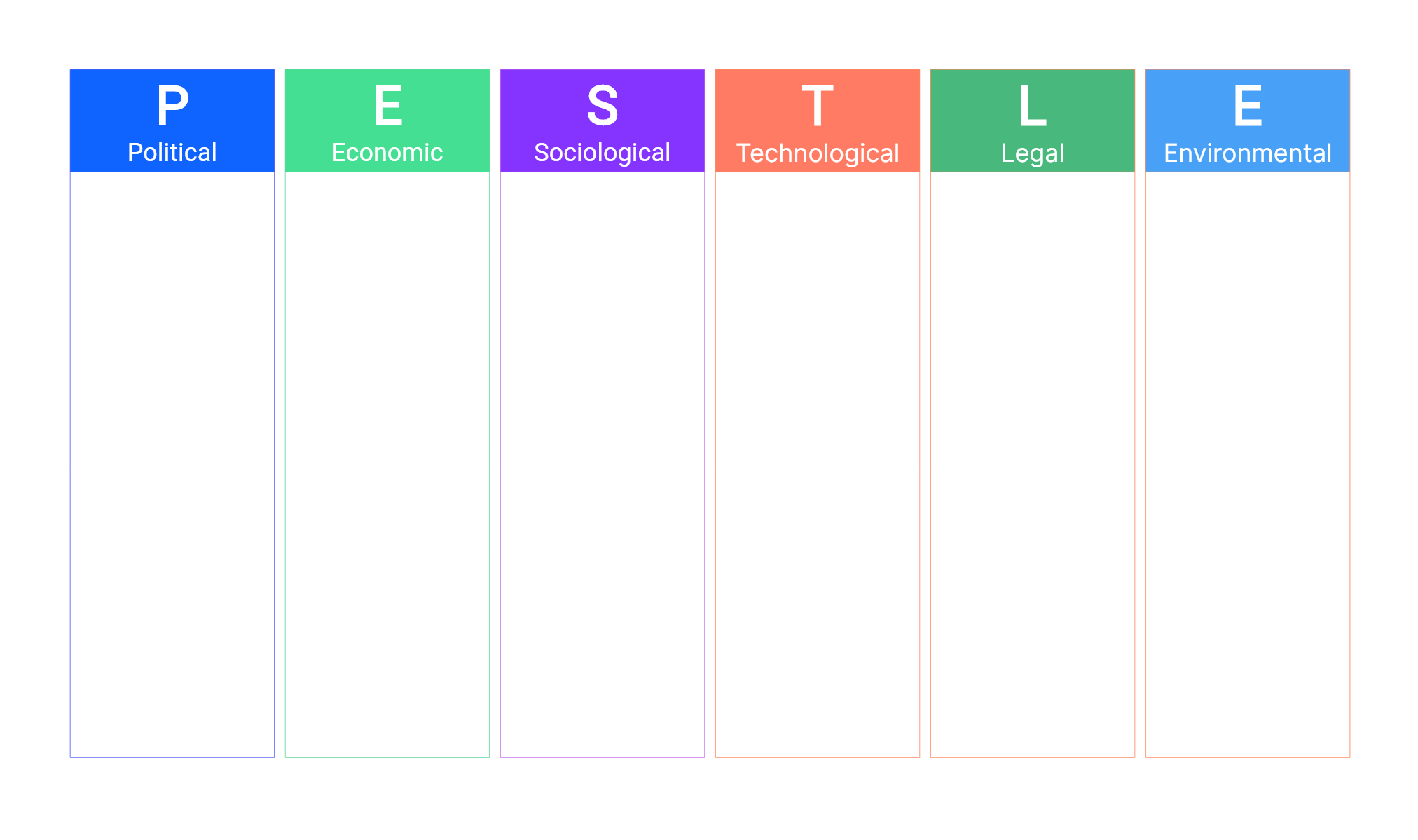
PESTLE, an acronym for Political, Economic, Social, Technological, Legal, and Environmental, represents a systematic approach to evaluating and understanding the macro-environmental factors that can shape and influence a business. Each of these components plays a distinct role in determining an organization's success or challenges in the market.
Factors of the PESTLE Analysis
Having established the overarching concept of the PESTLE analysis, let's now delve deeper into each of its constituent elements. So:
- Political Factor: At the cornerstone of any business environment are the political forces that govern it. This encompasses governmental policies, stability, and prevailing ideologies. Trade regulations, taxation policies, and geopolitical stability all fall under this category. For instance, changes in trade agreements can directly impact the import/export dynamics of a company, influencing its supply chain and overall profitability.
- Economic Factor: Economic variables hold immense sway over businesses, impacting everything from consumer spending power to investment potential. Key indicators like inflation rates, exchange rates, and GDP growth rates are scrutinized. Understanding these factors can help businesses navigate through recessions, capitalize on growth opportunities, or adjust pricing strategies based on currency fluctuations.
- Social Factor: The fabric of society, with its intricate weave of demographics, cultural norms, and lifestyle trends, forms a critical dimension. Businesses must adapt to changing consumer behaviors, preferences, and societal values. For example, a surge in health consciousness may drive demand for organic or health-centric products.
- Technological Factor: In today's fast-paced world, technological advancements are game-changers. This category encompasses innovation, automation, research and development, and digitalization. Companies that fail to keep pace with technological shifts risk obsolescence. Conversely, those at the forefront of innovation often gain a substantial competitive edge.
- Legal Factor: The legal framework within which a business operates can significantly impact its operations. This includes compliance with regulations, labor laws, safety standards, and intellectual property rights. Staying abreast of legal requirements is crucial for avoiding costly penalties and maintaining a positive reputation.
- Environmental Factor: With growing environmental consciousness, this factor has gained unprecedented importance. Companies are now scrutinized for their ecological footprint, sustainability practices, and adherence to environmental regulations. For example, industries that heavily rely on natural resources must navigate complex environmental policies.
PESTLE Analysis Examples for Food and Beverage Industry
In this section, we will apply the PESTLE analysis example for the food industry to some of the titans. These case studies will provide valuable insights into how external factors impact strategic decisions and operations within this dynamic sector.
PESTLE Analysis of Starbucks
Starbucks is a globally recognized coffeehouse chain with a presence in over 80 countries. Established in 1971, it has become synonymous with premium coffee and a comfortable café experience.
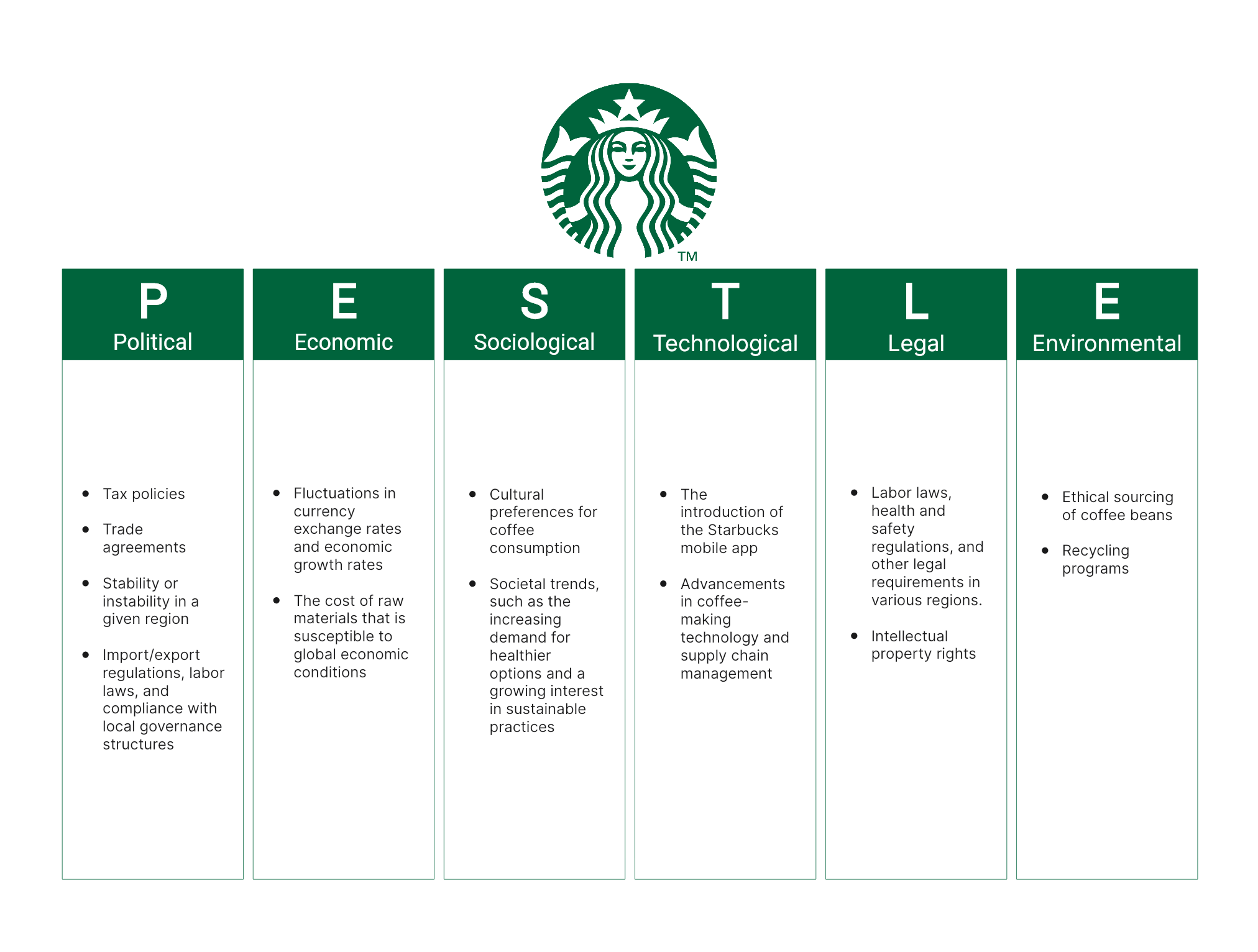
- Political: Starbucks is subject to various political influences, including trade policies and taxation. For instance, changes in international trade agreements can impact the cost and availability of coffee beans, a key ingredient for Starbucks.
- Economical: Economic factors like inflation rates and exchange rates affect profitability and pricing. Disposable income levels influence consumer spending on premium coffee.
- Social: Starbucks' success is tied to evolving societal trends. Emphasis on sustainability and ethical sourcing aligns with consumer preference for socially responsible businesses. Symbol of urban lifestyle and community gathering.
- Technological: Technology is crucial in operations, from mobile ordering apps to advanced coffee-making equipment. Innovations in payment systems and digital marketing enhance customer experience and efficiency.
- Legal: Operates in various jurisdictions with distinct legal frameworks, including regulations related to food safety, labor laws, and intellectual property rights. Adherence to them is crucial for continued success.
- Environmental: Environmental sustainability is the central focus. Climate change, waste management, and sustainable sourcing practices is also integral.
McDonald's PESTLE Analysis
McDonald's is a globally recognized fast-food chain, known for its iconic golden arches and signature menu items.
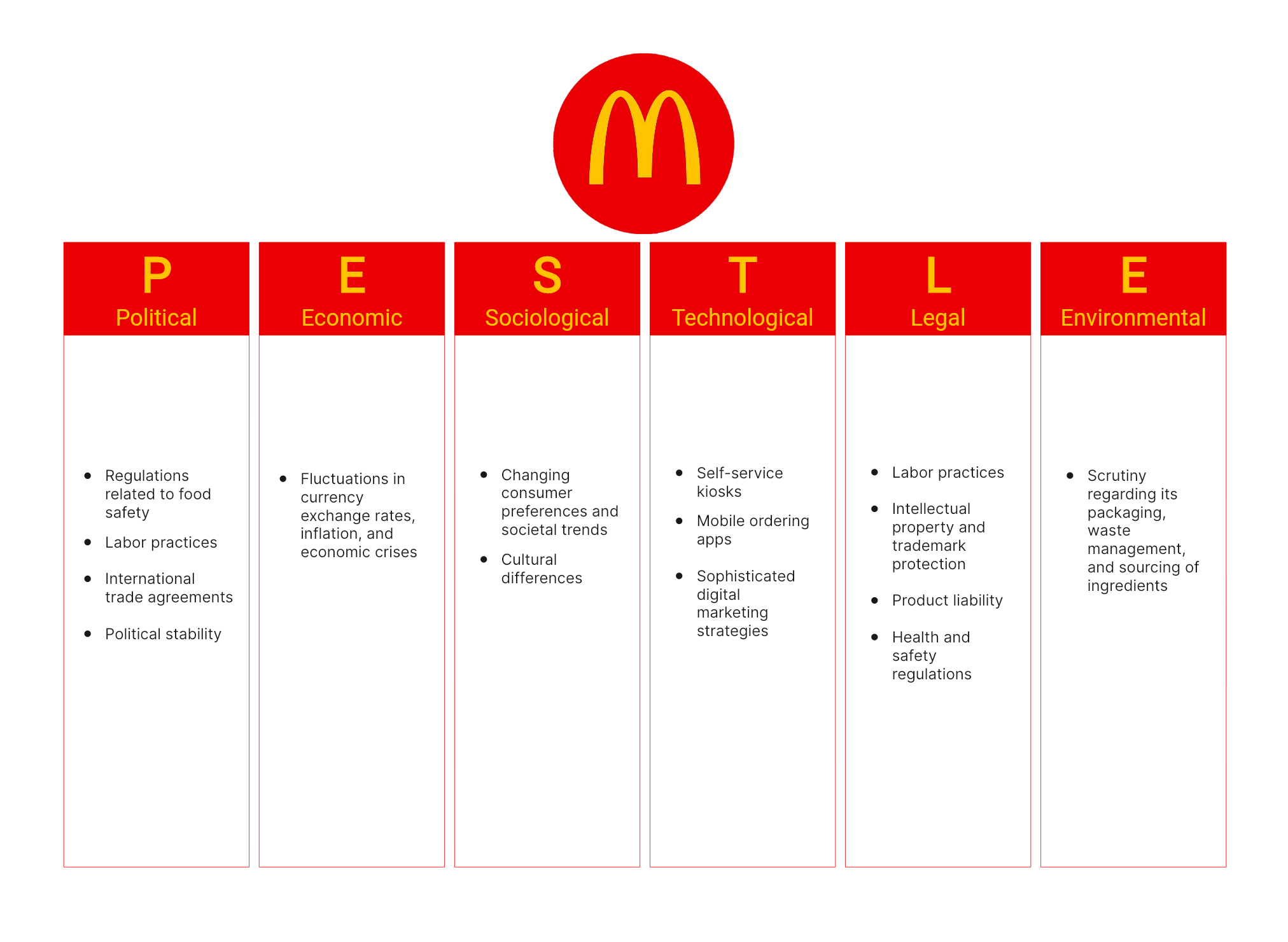
- Political: McDonald's is influenced by various political factors, including government policies on food safety and labor regulations. Changes in minimum wage laws and international trade agreements can impact operating costs.
- Economical: Economic factors such as currency exchange rates affect McDonald's profitability, especially in international markets. The company's pricing strategies are sensitive to changes in consumer purchasing power.
- Social: McDonald's success is closely tied to societal trends. The company's efforts to offer healthier menu options and address concerns about nutrition reflect the growing consumer preference for balanced and nutritious food choices.
- Technological: Technology is integral to McDonald's operations. Innovations in point-of-sale systems, self-service kiosks, and mobile ordering apps enhance the customer experience and operational efficiency.
- Legal: McDonald's operates in various legal jurisdictions, each with its own regulations related to food safety, advertising, and employment practices. Compliance with these laws is crucial for maintaining the brand's reputation and success.
- Environmental: Environmental sustainability is an increasingly important focus for McDonald's. The company has implemented initiatives to reduce waste, conserve energy, and source sustainable ingredients.
Start PESTLE Analysis for Free
PESTLE Analysis for Coca Cola
Coca-Cola is a global beverage company renowned for its iconic carbonated drinks. With a diverse product portfolio, it holds a prominent position in the soft drink industry.
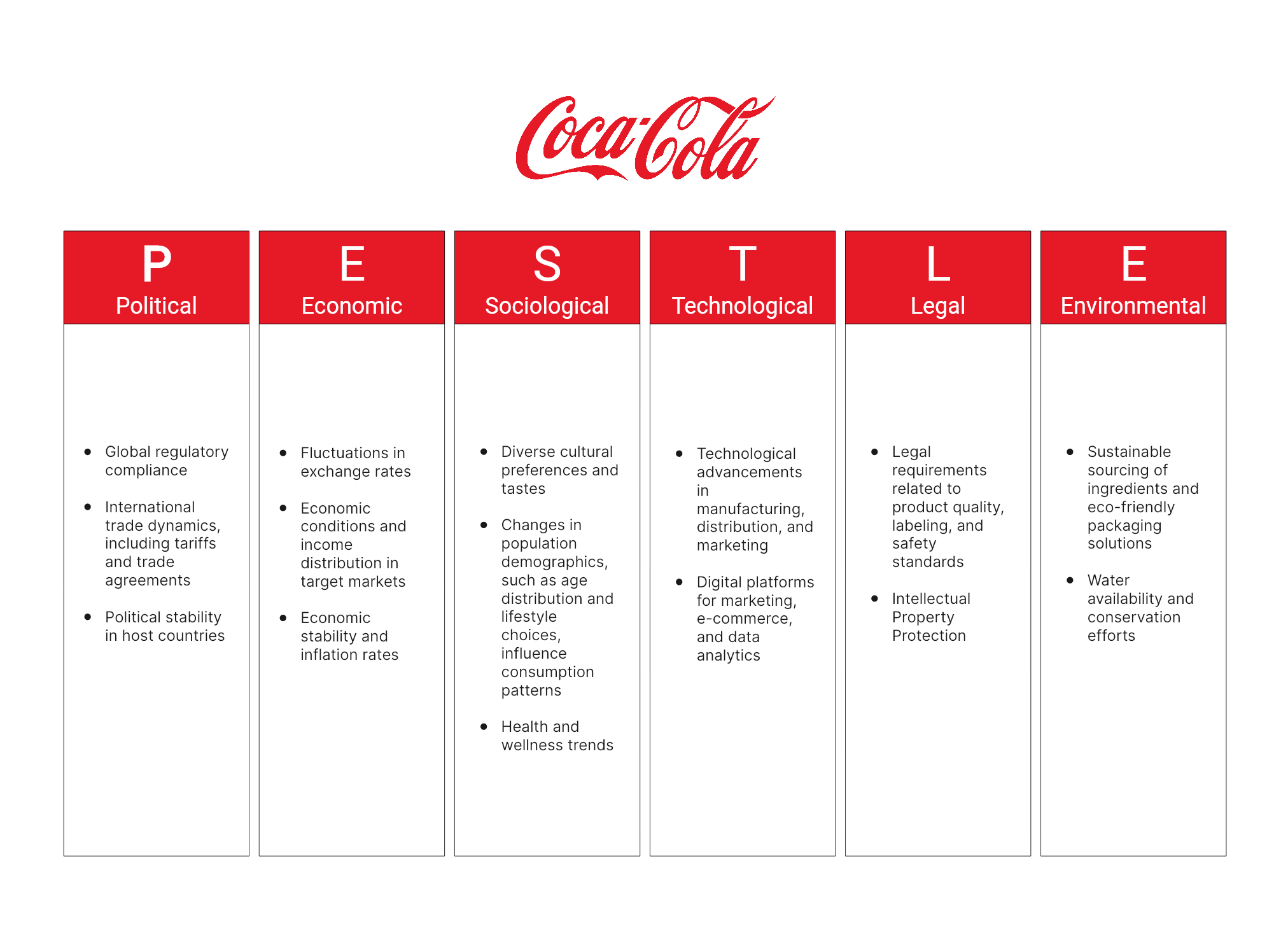
- Political: Political factors encompass the influence of regulations on Coca-Cola's operations. This includes considerations like trade tariffs, import/export regulations, and political stability in various regions where Coca-Cola operates.
- Economic: Economic factors pertain to the broader financial environment and its effect on Coca-Cola's business. For Coca-Cola, this translates into considerations about pricing strategies, market expansion decisions, and investment allocation across different markets.
- Social: Consumer behavior, health trends, and cultural preferences shape Coca-Cola's product offerings and marketing strategies.
- Technological: Innovations in bottling, packaging, and data analytics drive efficiency and product development for Coca-Cola.
- Legal: Product labeling, advertising, and compliance with food safety standards are critical legal considerations for Coca-Cola.
- Environmental: Sustainability efforts, including water conservation and waste reduction, align with Coca-Cola's commitment to environmental responsibility.
Start PESTLE Analysis for Free
PESTLE Analysis of Nestle
Nestlé is a multinational food and beverage conglomerate, renowned for its extensive range of consumer goods. From infant formula to pet food, Nestlé's diverse portfolio caters to a wide spectrum of consumer needs.
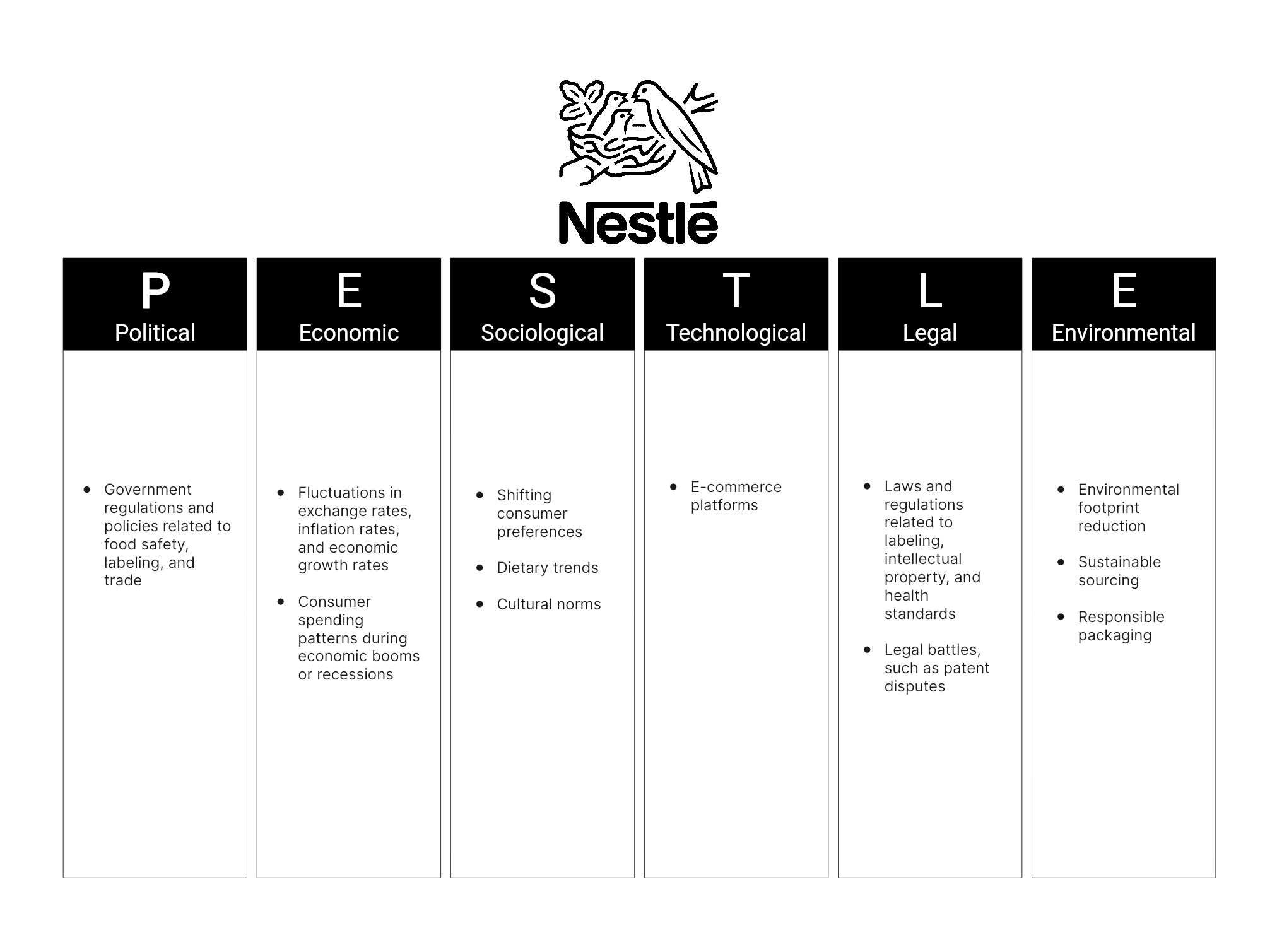
- Political: Political factors encapsulate the impact of government policies and regulations on Nestlé's operations. This includes considerations such as trade agreements, food safety standards, and geopolitical stability in regions where Nestlé conducts its business.
- Economic: Economic factors encompass the broader financial climate and its influence on Nestlé's activities. For Nestlé, this translates into strategies regarding pricing, market-entry, and investment allocation.
- Social: Sociological factors examine the societal and cultural influences on consumer behavior and preferences. In the case of Nestlé, this includes trends in health and wellness, changing dietary habits, and cultural attitudes towards food.
- Technological: Technological factors encompass advancements in technology that impact Nestlé's operations and industry trends. This spans from manufacturing automation and supply chain logistics to innovations in food processing and packaging.
- Legal: Legal factors refer to the legal framework within which Nestlé operates. Adhering to these legal requirements is essential for Nestlé to uphold its reputation and ensure consumer trust.
- Environmental: Environmental factors entail considerations related to sustainability and ecological impact. For Nestlé, this involves efforts to reduce water consumption, promote eco-friendly packaging, and engage in responsible sourcing practices. These initiatives align with Nestlé's commitment to environmental stewardship and resonate with eco-conscious consumers.
PESTEL Analysis Examples for the Automobile Industry
The automotive industry is a dynamic arena where technological innovation, regulatory compliance, and shifting consumer preferences play pivotal roles. In this section, we'll conduct a comprehensive PESTLE analysis of the automobile industry on two giants: Tesla and Toyota. These case studies will illuminate the external factors that shape their strategies and influence their position in the global automotive market.
Tesla PESTLE Analysis
Tesla, led by visionary entrepreneur Elon Musk, is a pioneering electric vehicle (EV) and clean energy company. Known for its cutting-edge technology and commitment to sustainable transportation, Tesla has disrupted the automotive industry and is a leader in the transition to renewable energy.
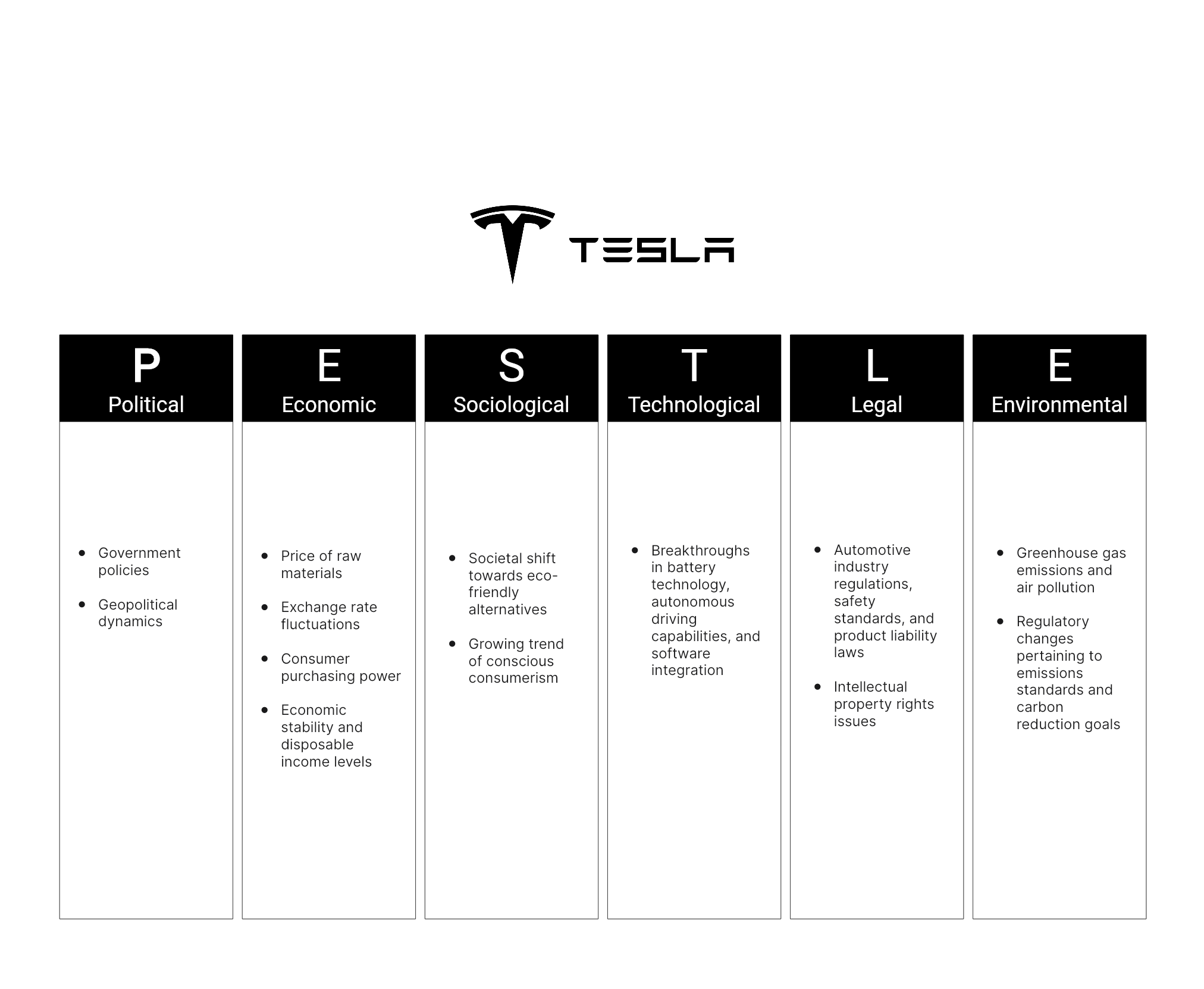
- Political: Government policies and regulations heavily influence Tesla's operations. This includes incentives for EV adoption, and trade policies that affect global production and distribution.
- Economic: Economic conditions impact Tesla's market growth and consumer demand for electric vehicles. Factors like consumer disposable income, interest rates, and government subsidies play a significant role in Tesla's sales and profitability.
- Social: Changing societal attitudes towards sustainability and environmental consciousness are driving demand for Tesla's products. The company's focus on reducing carbon emissions aligns with the increasing global concern for climate change.
- Technological: Tesla's success is deeply tied to its technological innovation. Breakthroughs in battery technology, autonomous driving capabilities, and energy storage solutions are central to Tesla's competitive advantage and market leadership.
- Legal: Legal considerations include regulations related to vehicle safety, intellectual property protection, and compliance with industry-specific standards. Tesla's ability to navigate these legal frameworks is crucial for its continued success and growth.
- Environmental: Tesla's mission to accelerate the world's transition to sustainable energy is at the core of its business. Factors like climate change awareness, renewable energy policies, and advancements in green technology directly impact Tesla's market opportunities and brand reputation.
Toyota PESTLE Analysis
Toyota, a global automotive industry leader, is renowned for its commitment to quality, innovation, and sustainability, producing a wide range of vehicles trusted by consumers worldwide.
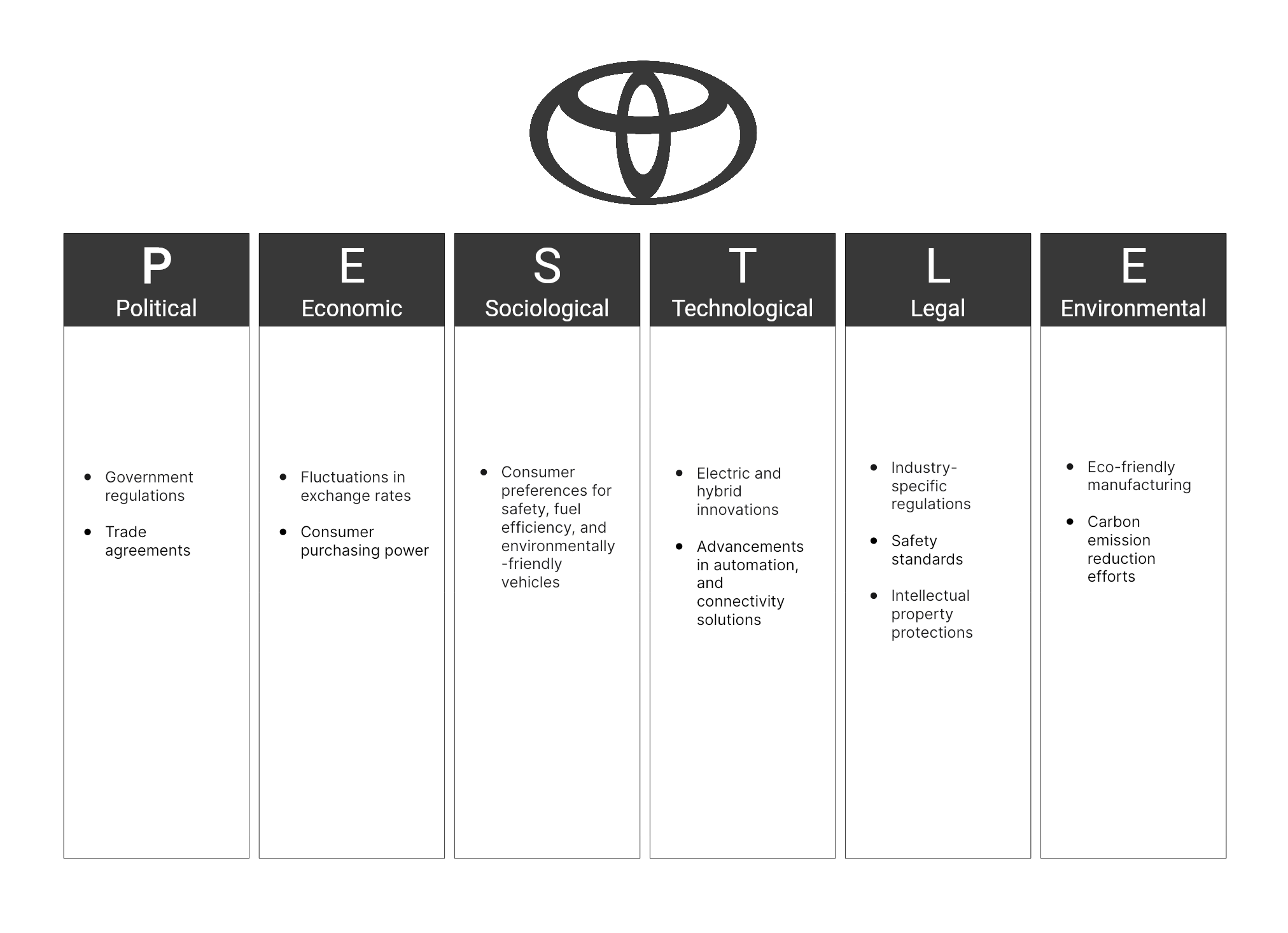
- Political: Government regulations, and trade agreements significantly shape Toyota's operations and market access.
- Economic: Fluctuations in exchange rates and consumer purchasing power directly impact Toyota's sales, profitability, and investment strategies.
- Social: Consumer preferences for safety, fuel efficiency, and environmentally friendly vehicles influence Toyota's product development and market strategies.
- Technological: Advancements in automotive technology, such as electric and hybrid innovations, automation, and connectivity solutions, drive Toyota's competitiveness and product offerings.
- Legal: Adherence to industry-specific regulations, safety standards, and intellectual property protections are crucial for Toyota's sustained success and responsible corporate image.
- Environmental: Toyota's dedication to sustainability, seen through eco-friendly manufacturing and carbon emission reduction efforts, resonates with environmentally-conscious consumers and aligns with global sustainability goals.
Start PESTLE Analysis for Free
PESTEL Analysis Examples for the Retail Industry
In the fast-paced world of retail, understanding the external forces at play is essential for success. This section delves into the retail sector, a dynamic industry shaped by consumer trends, economic fluctuations, and regulatory landscapes. Through PESTEL analysis retail industry, we'll uncover the strategic considerations that drive industry leaders, including Walmart, Tesco, and IKEA.
Walmart PESTLE Analysis
Walmart, a multinational retail giant, is recognized for its extensive network of discount department stores and a diverse range of products, making it one of the world's largest retailers.
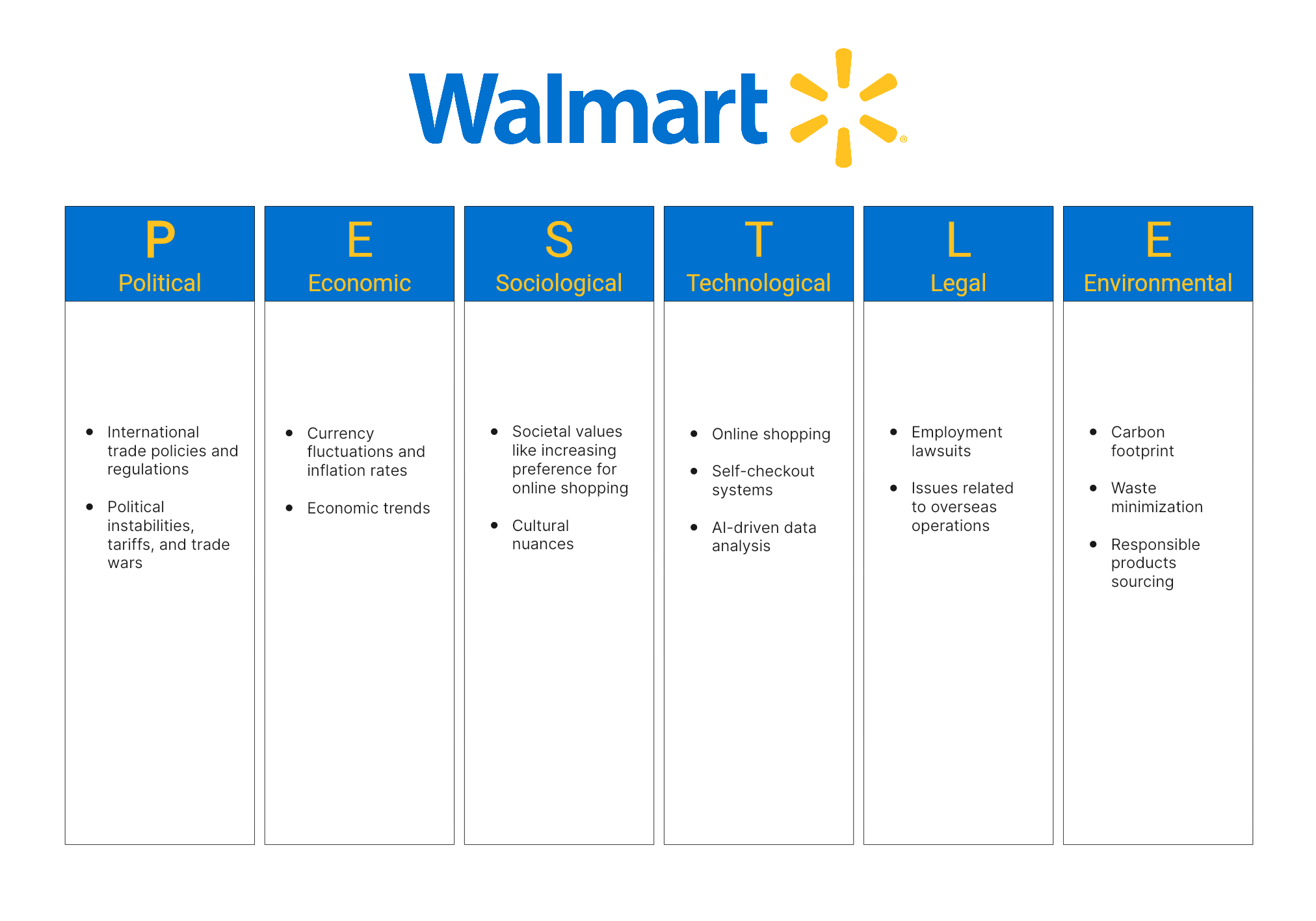
- Political: Government policies and regulations regarding taxation, and employment standards impact Walmart's operations and global expansion strategies.
- Economic: Economic conditions, like consumer spending trends, influence Walmart's sales performance and pricing strategies.
- Social: Changing consumer preferences for convenience, affordability, and ethical sourcing practices shape Walmart's product offerings and marketing strategies.
- Technological: Technological advancements in e-commerce, automation, and data analytics play a crucial role in enhancing Walmart's operational efficiency and customer experience.
- Legal: Compliance with labor laws, product safety regulations, and intellectual property rights is essential for Walmart's reputation and legal standing.
- Environmental: Walmart's commitment to sustainability, demonstrated through initiatives like renewable energy adoption and waste reduction, aligns with growing environmental awareness among consumers.
Start PESTLE Analysis for Free
Tesco PESTLE Analysis
Tesco, a prominent multinational retailer, is known for its widespread presence in the grocery and general merchandise market. With a diverse product range and strong market position, Tesco has established itself as one of the largest retail chains globally.
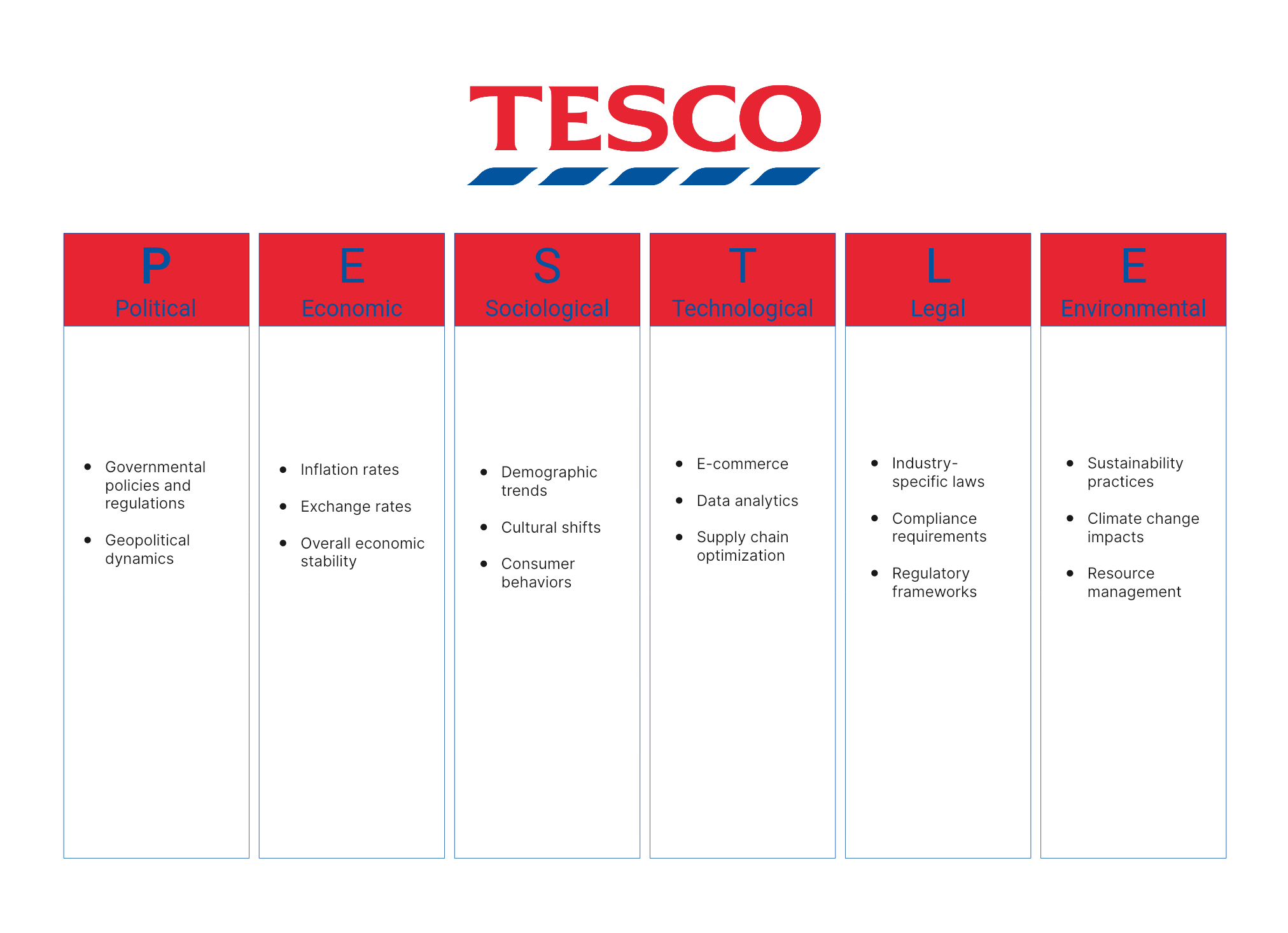
- Political: Government policies on taxation, trade, and labor laws directly impact Tesco's operations, including supply chain management and international expansion strategies.
- Economic: Economic conditions, such as inflation rates and consumer spending power, significantly influence Tesco's sales, profitability, and market strategies.
- Social: Changing consumer preferences for healthy, ethically-sourced, and convenient products shape Tesco's product offerings and marketing strategies, aligning with shifting societal values.
- Technological: Technological advancements in e-commerce, data analytics, and supply chain management play a crucial role in Tesco's competitive edge and its ability to meet customer demands efficiently.
- Legal: Compliance with industry-specific regulations, food safety standards, and employment laws are essential for Tesco's continued success and reputation as a responsible corporate entity.
- Environmental: Tesco's focus on sustainability, including waste reduction and energy efficiency, resonates with environmentally-conscious consumers and aligns with global efforts towards sustainability.
IKEA PESTLE Analysis
IKEA, a renowned Swedish multinational, is globally acclaimed for its affordable and stylish furniture offerings, epitomizing the concept of functional design for everyday living.
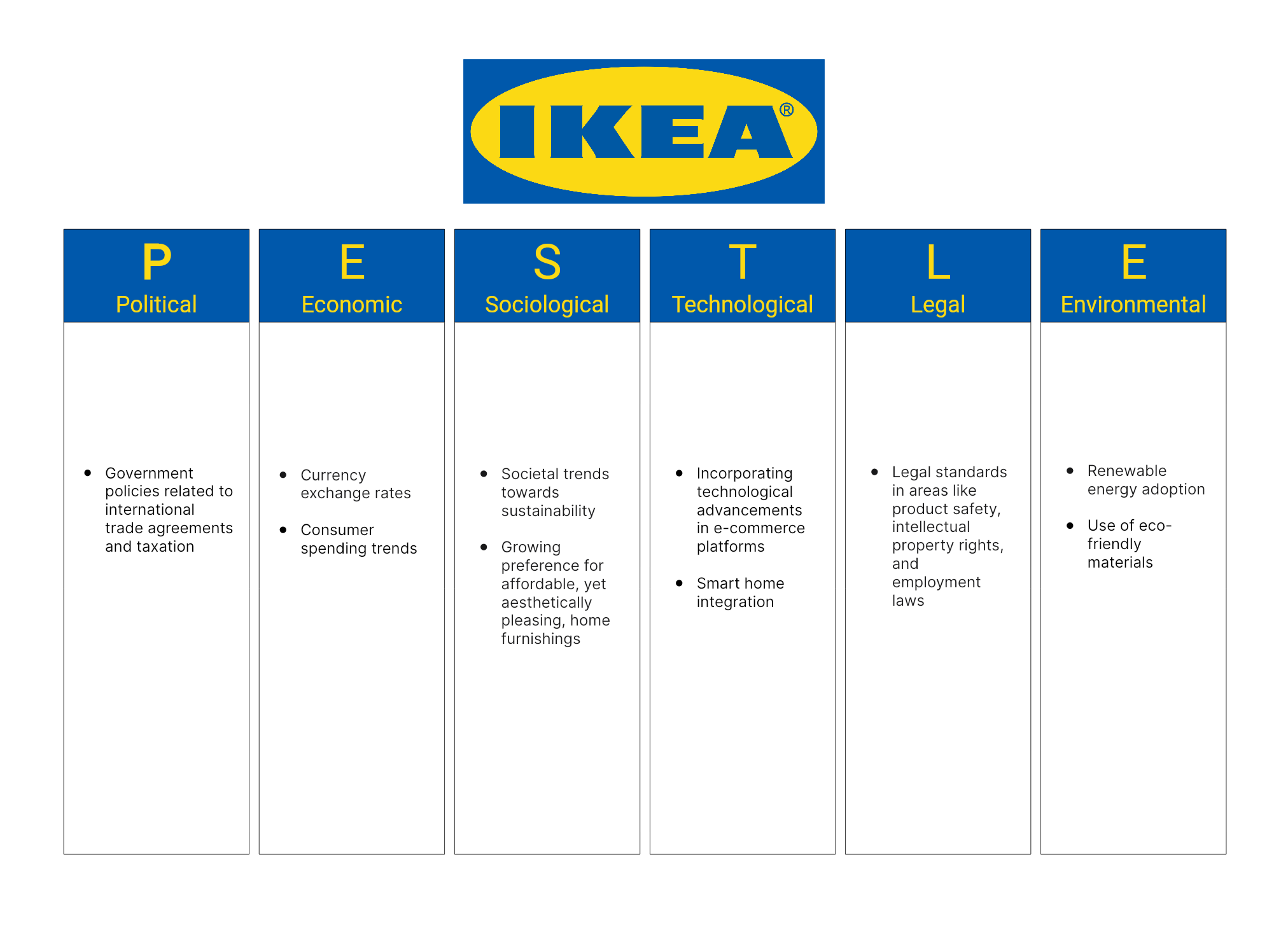
- Political: Government policies related to international trade agreements and taxation impact IKEA's global supply chain and sourcing strategies.
- Economic: Economic conditions, such as currency exchange rates and consumer spending trends, directly influence IKEA's pricing strategies and market expansion decisions.
- Social: Societal trends towards sustainability and a growing preference for affordable, yet aesthetically pleasing, home furnishings inform IKEA's product designs and marketing strategies.
- Technological: Incorporating technological advancements in e-commerce platforms and smart home integration allows IKEA to enhance the customer shopping experience.
- Legal: Adherence to legal standards in areas like product safety, intellectual property rights, and employment laws is crucial for IKEA's brand reputation and global operations.
- Environmental: IKEA's dedication to sustainability is evident through initiatives such as renewable energy adoption and the use of eco-friendly materials, reflecting the company's commitment to environmental stewardship.
Start PESTLE Analysis for Free
Fashion Industry PESTEL Analysis Examples
The fashion industry, a realm of trends, innovation, and global consumer influence, is profoundly impacted by external factors. In this section, we delve into four industry powerhouses: Nike, Zara, Adidas, and H&M. Through meticulous fashion industry PESTEL analysis, we uncover the strategic considerations that guide these fashion giants in a world where style meets strategy.
Nike PESTLE Analysis
Nike, a global athletic apparel and footwear giant, is renowned for its cutting-edge designs, innovation, and strong brand identity in the sports industry.
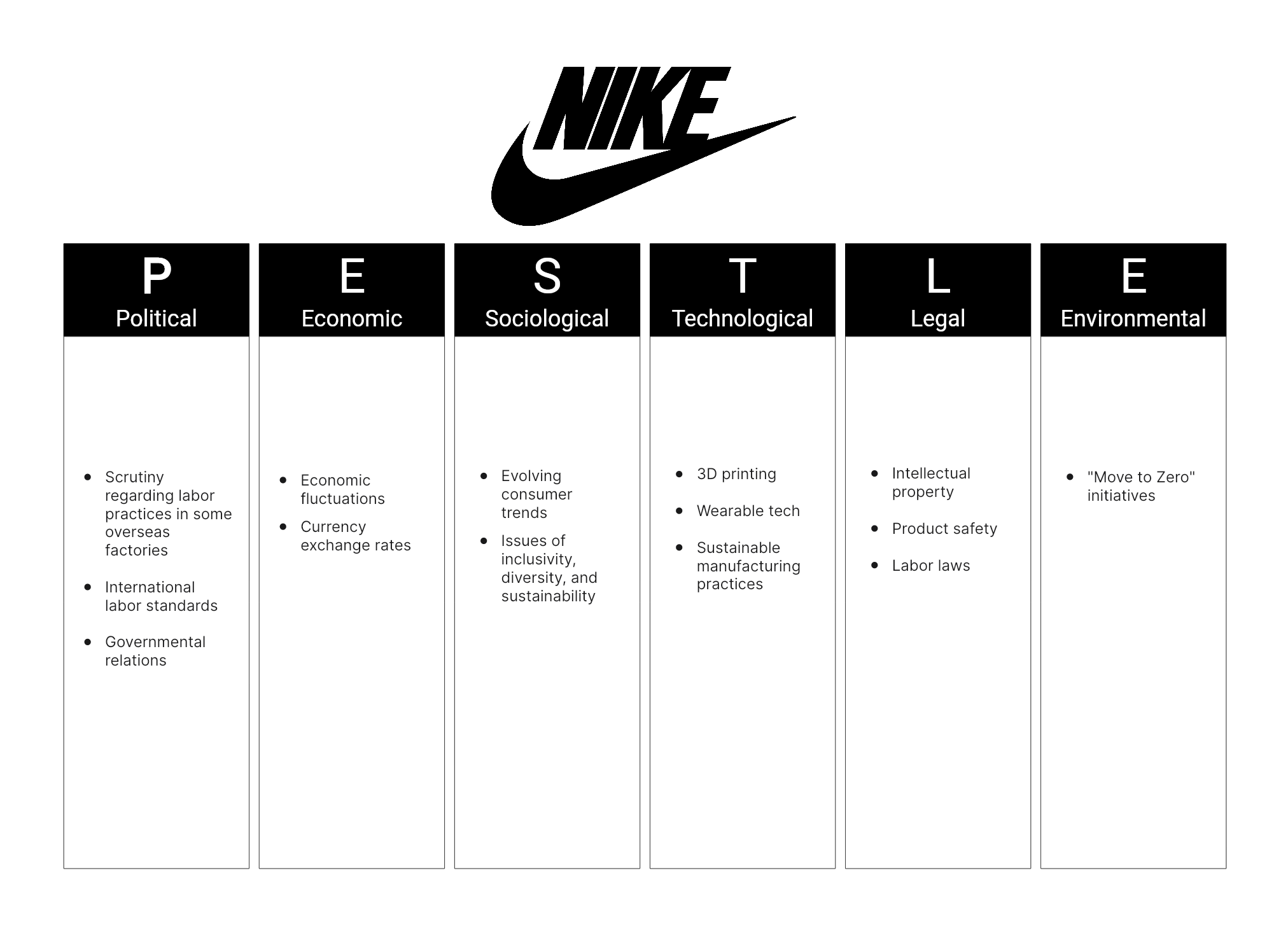
- Political: Government policies on labor laws directly influence Nike's global supply chain and manufacturing practices.
- Economic: Economic conditions, like consumer spending patterns, impact Nike's pricing strategies and market positioning.
- Social: Shifting consumer preferences towards athleisure and a focus on health and wellness guide Nike's product development and marketing strategies.
- Technological: Incorporating technology in products, such as smart footwear and digital platforms, keeps Nike at the forefront of innovation in the sportswear industry.
- Legal: Adherence to legal standards in areas like intellectual property rights and fair labor practices is crucial for Nike's reputation and brand image.
- Environmental: Nike's commitment to sustainability is reflected in initiatives like using recycled materials and reducing its environmental footprint, aligning with global environmental goals.
Zara PESTLE Analysis
Zara, a globally recognized fashion retailer, is acclaimed for its agile supply chain, trend-setting designs, and accessible pricing in the fast fashion industry.
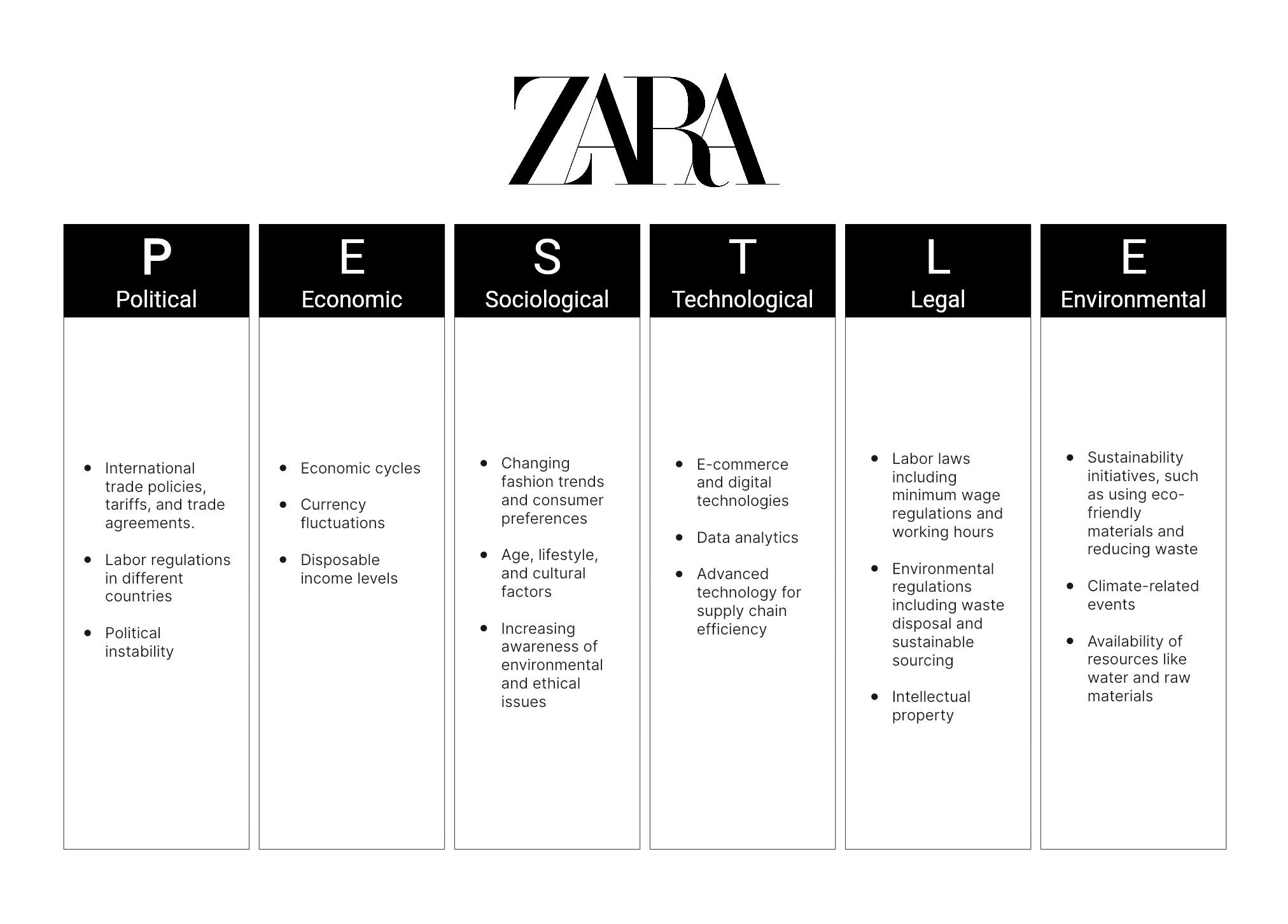
- Political: Zara's global operations are influenced by political stability affecting its supply chain management and sourcing strategies.
- Economic: Economic conditions like exchange rates, play a crucial role in shaping Zara's pricing strategies and market expansion decisions.
- Social: Zara's success is closely linked to societal trends, particularly the demand for fast, affordable fashion, and a growing awareness of sustainable practices in the industry.
- Technological: Technological integration in inventory management and data analytics enables Zara to maintain its reputation for timely, trend-driven fashion offerings.
- Legal: Adherence to legal standards in areas such as intellectual property rights, labor laws, and product safety regulations is vital for safeguarding Zara's brand integrity.
- Environmental: Zara's efforts towards sustainability, including initiatives to reduce waste and promote ethical sourcing, align with evolving consumer expectations for eco-conscious fashion choices.
Start PESTLE Analysis for Free
Adidas PESTLE Analysis
Adidas, a global sportswear giant, is celebrated for its innovation, performance-driven products, and a strong brand presence in the athletic apparel industry.
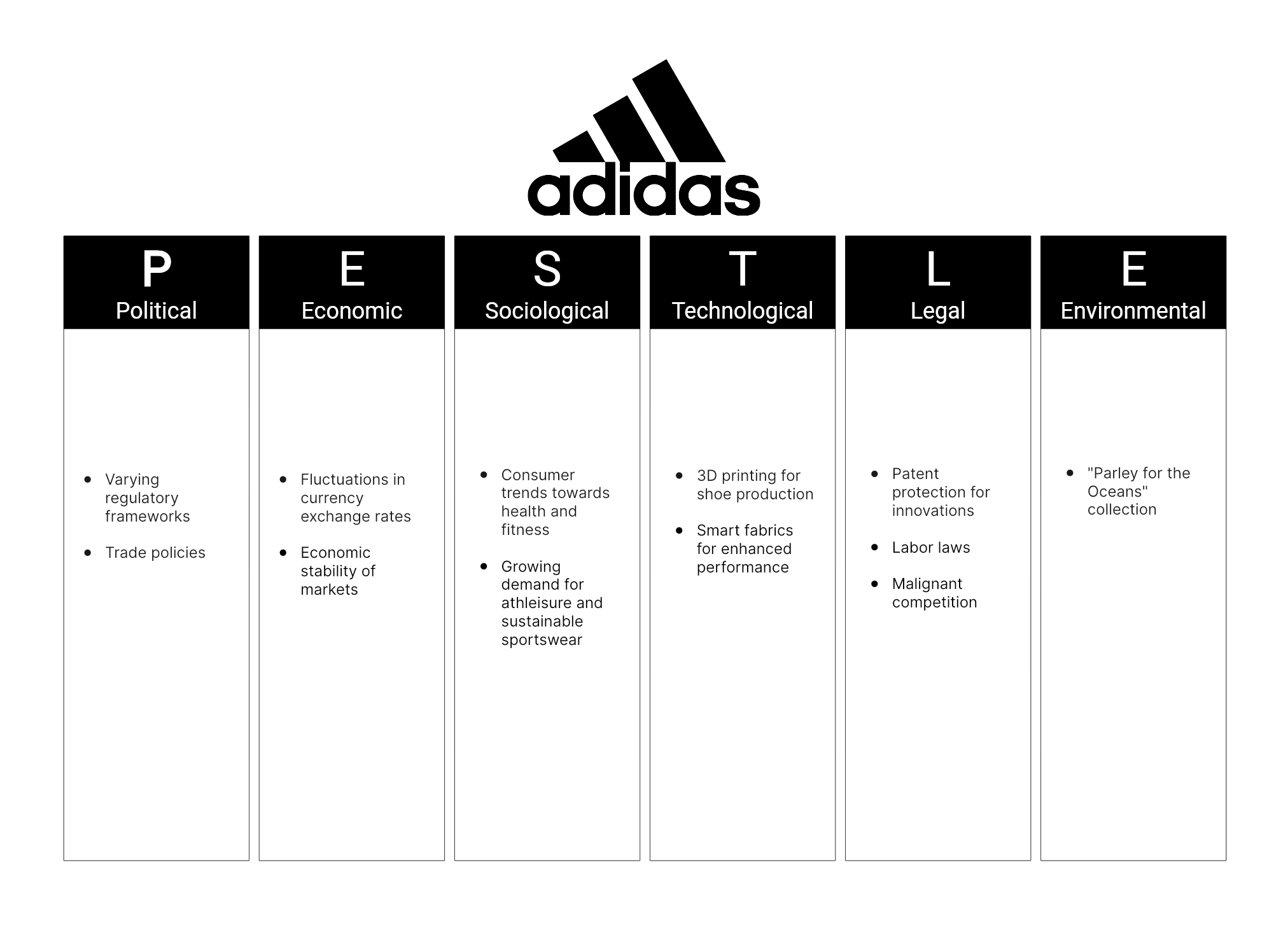
- Political: Adidas operates in numerous countries, making it susceptible to varying political environments. For instance, trade policies can affect production costs and profit margins.
- Economic: Fluctuations in exchange rates and economic stability of markets impact Adidas's pricing strategies, especially in international sales where currency values can greatly affect revenue.
- Social: Consumer trends towards health and fitness have been a significant driver for Adidas. The growing demand for athleisure and sustainable sportswear reflects changing societal preferences.
- Technological: Adidas has been at the forefront of technology adoption. Innovations like 3D printing for shoe production and smart fabrics for enhanced performance are examples of its tech-driven approach.
- Legal: Adidas deals with numerous legal aspects including patent protection for innovations, compliance with labor laws, and ensuring fair competition in the market.
- Environmental: Adidas places a strong emphasis on sustainability. Initiatives like their "Parley for the Oceans" collection, which utilizes recycled plastic.
H&M PESTLE Analysis
H&M, a global fashion retailer, is renowned for its affordable, trend-driven apparel and accessories, epitomizing accessible style in the fast fashion industry.
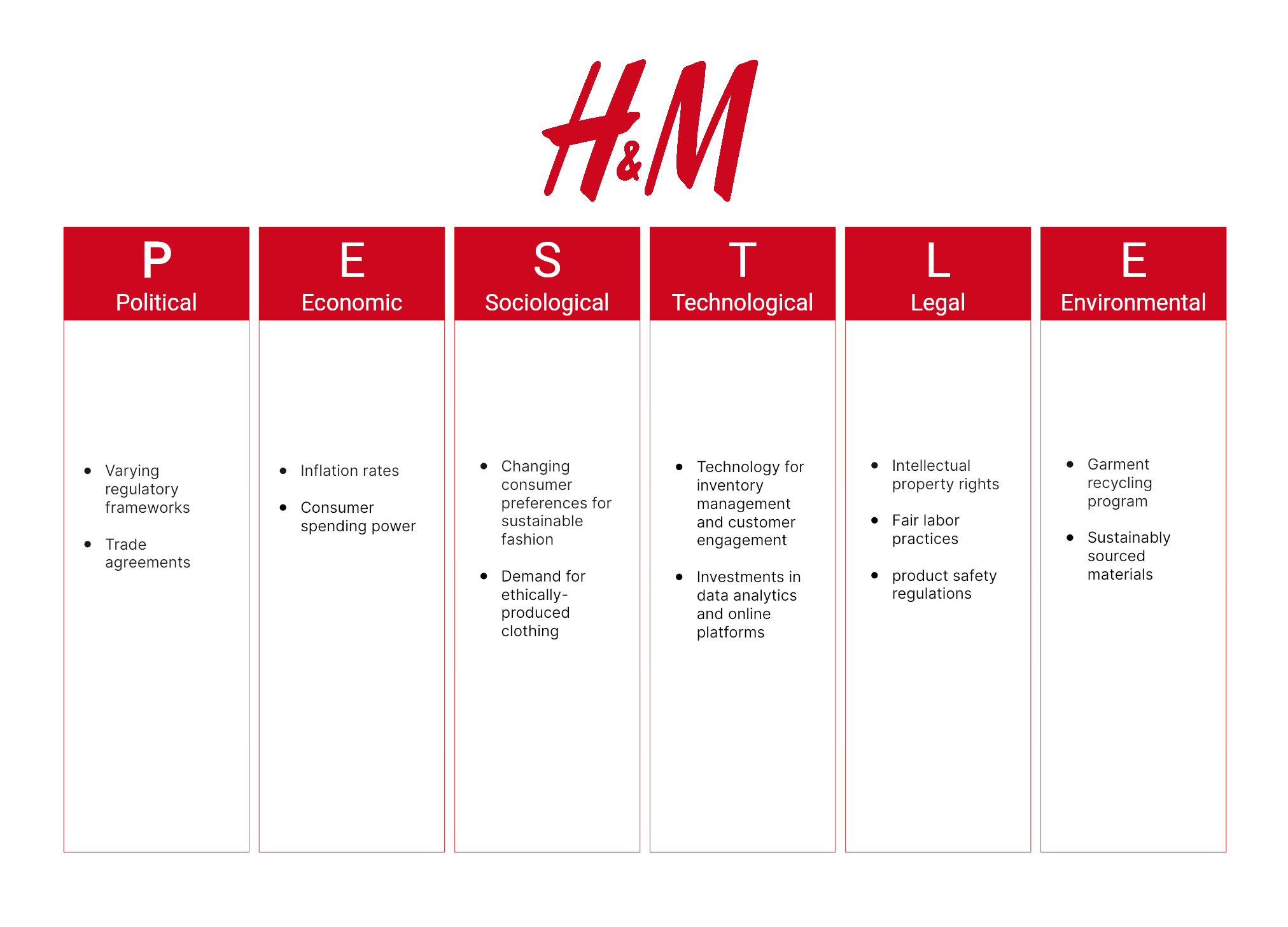
- Political: H&M's expansive global presence exposes it to varying political landscapes. For instance, trade agreements impact its production costs and supply chain operations.
- Economic: Economic conditions in different markets, including consumer spending power and inflation rates, shape H&M's pricing strategies and market expansion decisions.
- Social: Changing consumer preferences for sustainable fashion and the demand for ethically-produced clothing inform H&M's commitment to conscious and eco-friendly collections.
- Technological: H&M leverages technology for inventory management and customer engagement. Investments in data analytics and online platforms enhance its customer experience and market insights.
- Legal: Compliance with intellectual property rights, fair labor practices, and product safety regulations are paramount for H&M's reputation and market presence.
- Environmental: H&M's dedication to sustainability is seen through initiatives like their garment recycling program and their commitment to using sustainably sourced materials.
Start PESTLE Analysis for Free
PESTEL Analysis Examples for the Smartphone Industry
In the dynamic realm of the smartphone industry, external factors exert profound influence on market leaders. This section delves into two giants: Apple and Samsung. Through meticulous PESTEL analysis of the smartphone industry, we uncover the strategic considerations that guide these tech behemoths in a world where innovation meets consumer demand.
Apple PESTLE Analysis
Apple, a global technology leader, is known for its iconic design, cutting-edge innovation, and premium electronic devices, setting industry benchmarks.
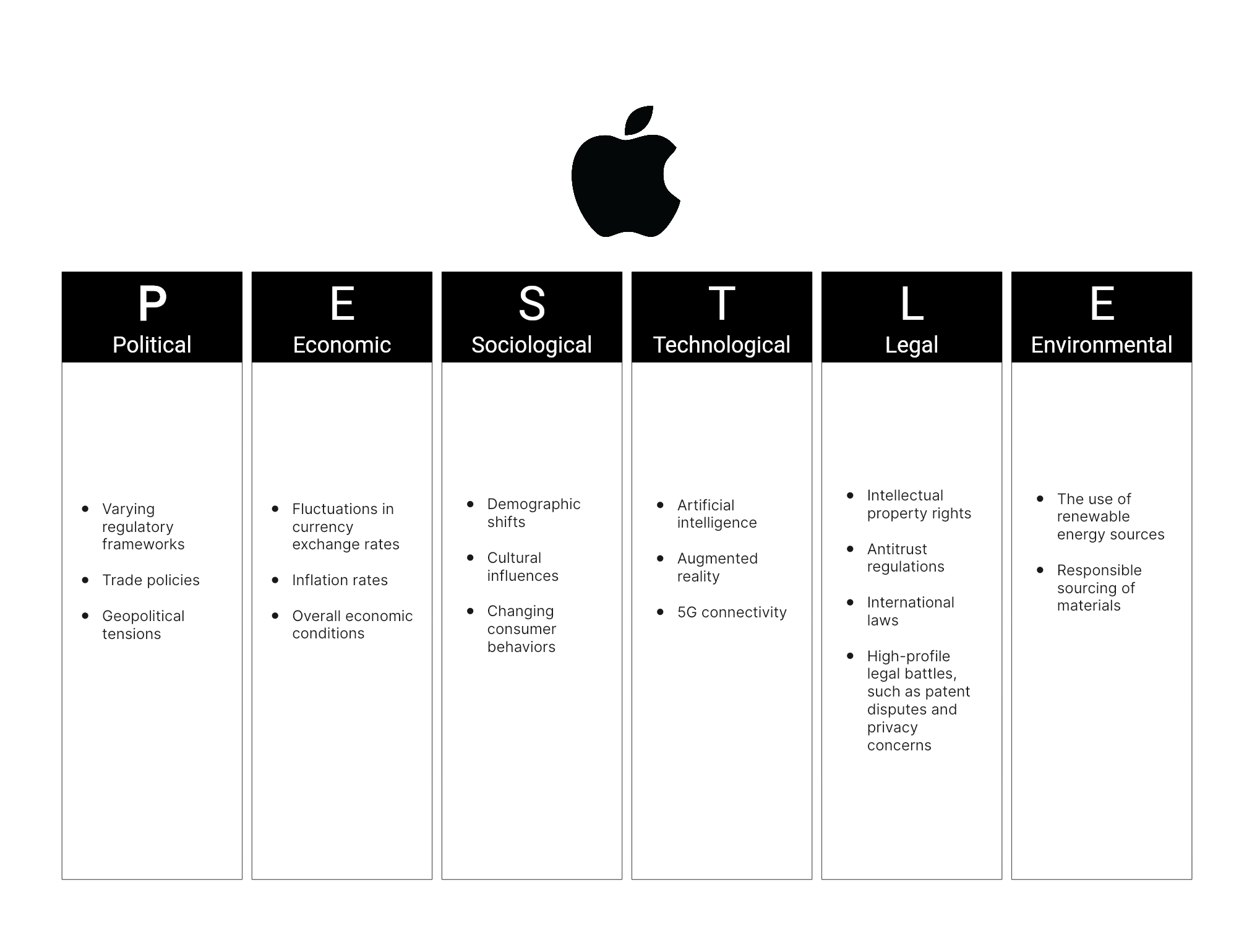
- Political: Apple's global reach exposes it to diverse political landscapes, influencing trade policies, taxation, and regulatory compliance, affecting production and market accessibility.
- Economic: Economic conditions, including exchange rates directly impact Apple's pricing strategies and revenue in international markets.
- Social: User preferences for seamless, high-quality technology and growing concerns for data privacy influence Apple's product development and brand loyalty.
- Technological: Apple's relentless pursuit of technological innovation, evident in advancements like the introduction of 5G, solidifies its position as a frontrunner in the industry.
- Legal: Legal considerations include intellectual property protection, antitrust regulations, and compliance with industry-specific standards, crucial for safeguarding Apple's innovations and market position.
- Environmental: Apple's green initiatives, including reduced carbon footprint and use of recycled materials, resonate with eco-conscious consumers and support global environmental goals.
Samsung PESTLE Analysis
Samsung, a global tech giant, leads in various domains, from consumer electronics to semiconductor technology, exemplifying innovation and market influence.
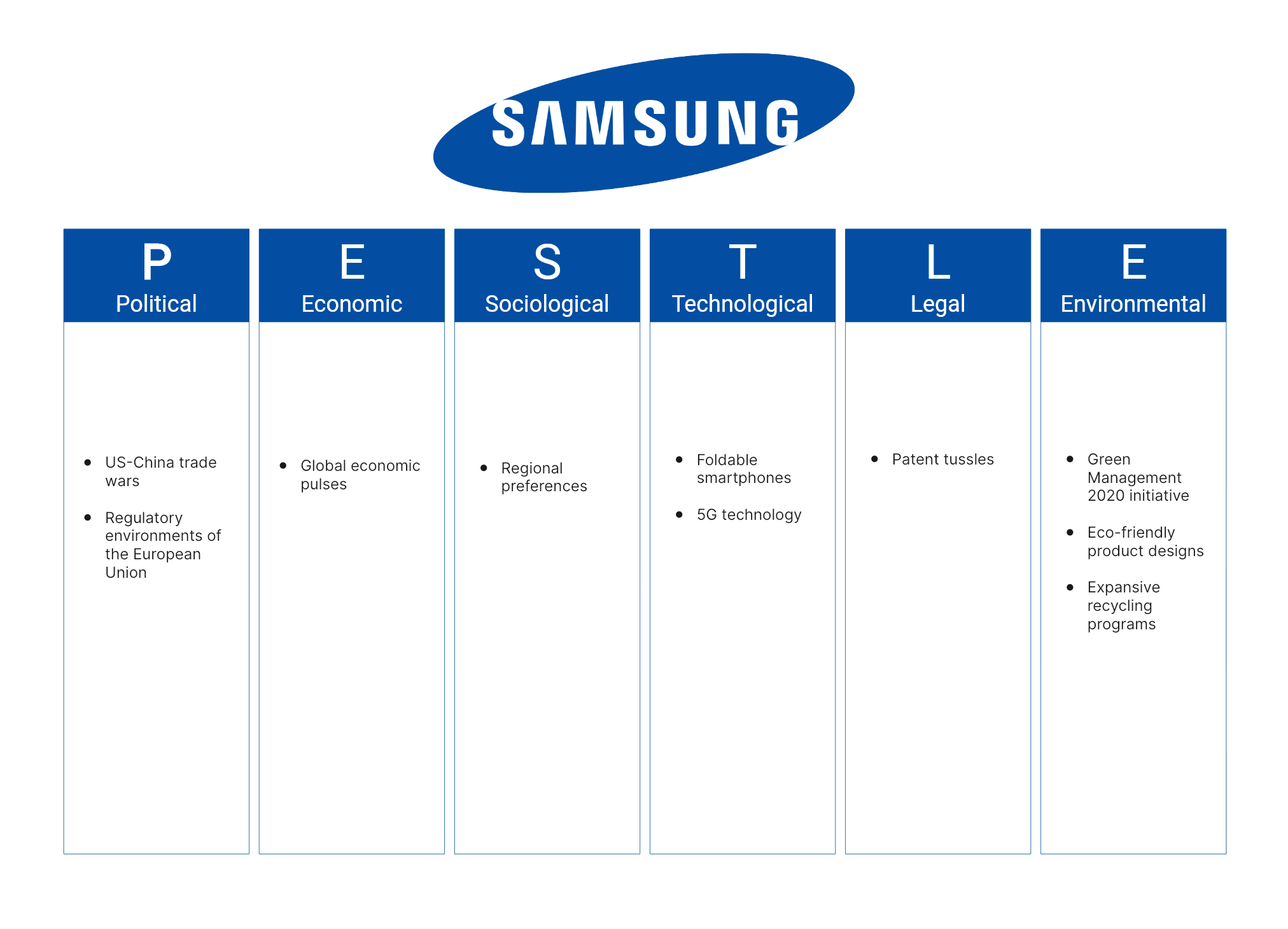
- Political: Samsung's operations are subject to geopolitical dynamics and trade policies, influencing supply chains and global market strategies.
- Economical: Currency fluctuations and consumer purchasing power directly affect Samsung's pricing strategies and revenue, especially in diverse international markets.
- Social: Consumer demand for cutting-edge technology and a preference for socially responsible brands shape Samsung's product development and brand image.
- Technological: Samsung's technological innovations, particularly in semiconductor technology and consumer electronics, solidify its position as an industry leader.
- Legal: Intellectual property protection, compliance with antitrust regulations, and adherence to industry standards are crucial for Samsung's continued market dominance.
- Environmental: Samsung's initiatives for sustainable product design and responsible sourcing reflect its commitment to environmental stewardship and resonate with eco-conscious consumers.
Start PESTLE Analysis for Free
Key Takeaway: A PESTLE Analysis Template and a One-stop Tool
In summary, this guide offers insightful PESTLE analysis examples across diverse industries, from food and automobile to retail, fashion, and smartphones. By examining real-world cases, we've uncovered how external factors shape strategic analysis for insightful decisions. Additionally, Boardmix’s one-stop PESTLE analysis template equips businesses to conduct their own assessments effectively, ensuring informed decision-making in any industry. Elevate your strategic planning with this valuable resource.
Features of Making PESTLE Analysis on Boardmix
Boardmix's digital whiteboard provides an excellent platform for creating dynamic and engaging PESTLE analyses. PESTLE analysis - an acronym for Political, Economic, Social, Technological, Legal, and Environmental factors - is a strategic tool used to understand the macro-environmental factors that affect an organization. With its variety of features and intuitive interface, Boardmix is an ideal tool for this kind of strategic analysis. Here are some notable features that make Boardmix an effective platform for PESTLE analysis.
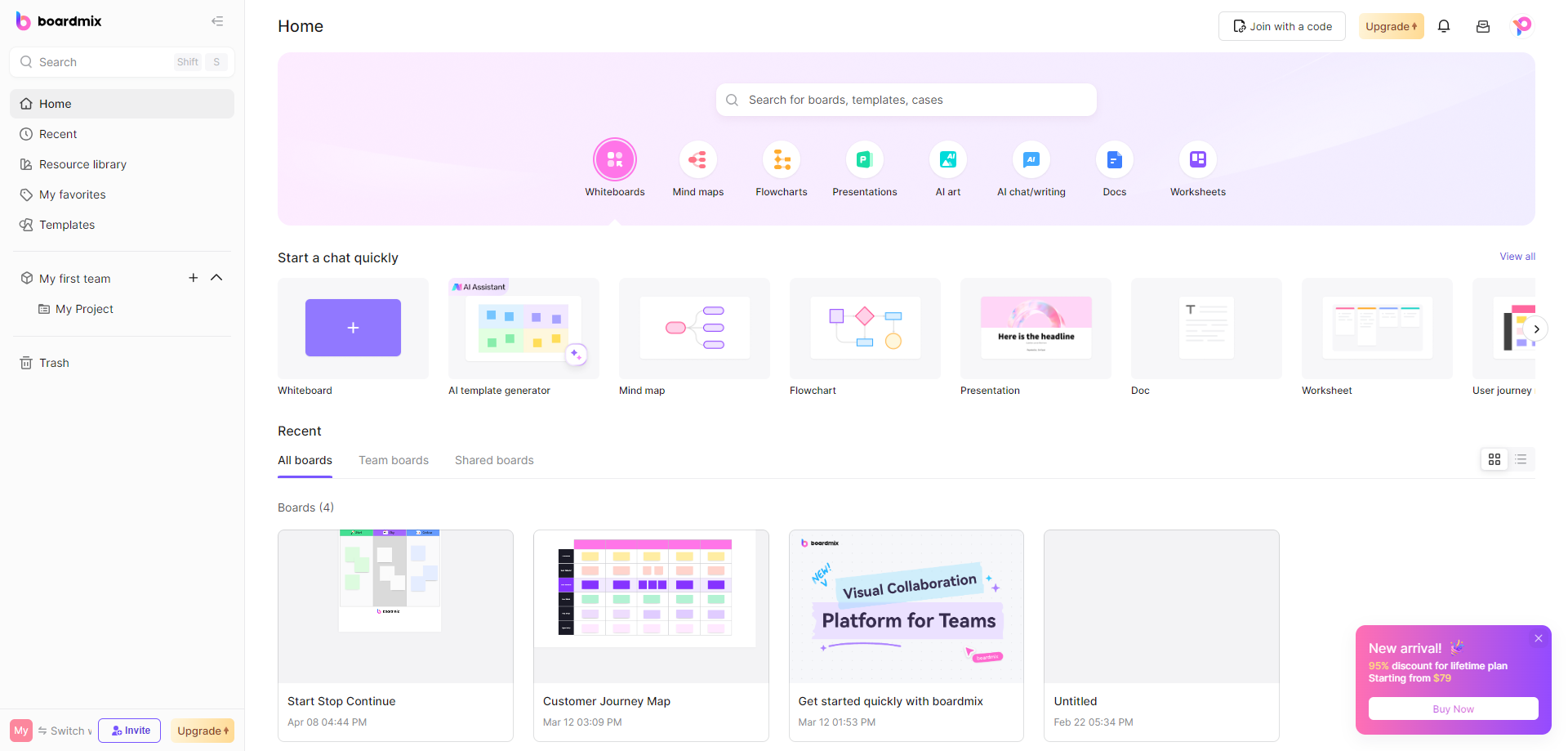
1. Interactive Whiteboard Interface
The interactive whiteboard is a powerful tool for visualizing your PESTLE analysis. You can draw, write, erase, and move elements freely on the board, allowing for dynamic interaction with your analysis.
2. Collaborative Tools
Boardmix allows multiple users to work together on a single whiteboard in real-time. This means you can collaborate with your team members on the same PESTLE analysis simultaneously, allowing for real-time brainstorming and discussion.
3. Multimedia Integration
With Boardmix, you can enrich your PESTLE analysis by integrating multimedia elements directly onto the whiteboard. These could include relevant news articles, video clips, data visualizations, and other resources that provide additional context and depth to your analysis.
4. AI-Assisted Idea Generation
One of Boardmix's standout features is its AI enhancement, which can suggest related concepts or ideas based on your input. This can be particularly useful in a PESTLE analysis to uncover hidden correlations or potential impacts that might not be immediately apparent.
5. Drag-and-Drop Functionality
Boardmix’s drag-and-drop feature allows you to easily arrange and re-arrange elements on your PESTLE analysis. This allows you to create logical groupings or highlight specific relationships between different factors in your analysis.
6. Templates and Pre-made Resources
Boardmix offers a variety of pre-made templates and resources that can expedite the creation of your PESTLE analysis. You can choose a template that best fits your needs and customize it as required.
7. Cloud Storage and Accessibility
Boardmix stores all your whiteboards securely in the cloud, ensuring you can access and continue your work from anywhere and at any time. Furthermore, as a web-based platform, Boardmix is compatible with a wide range of devices, making it a versatile tool for remote or distributed teams.
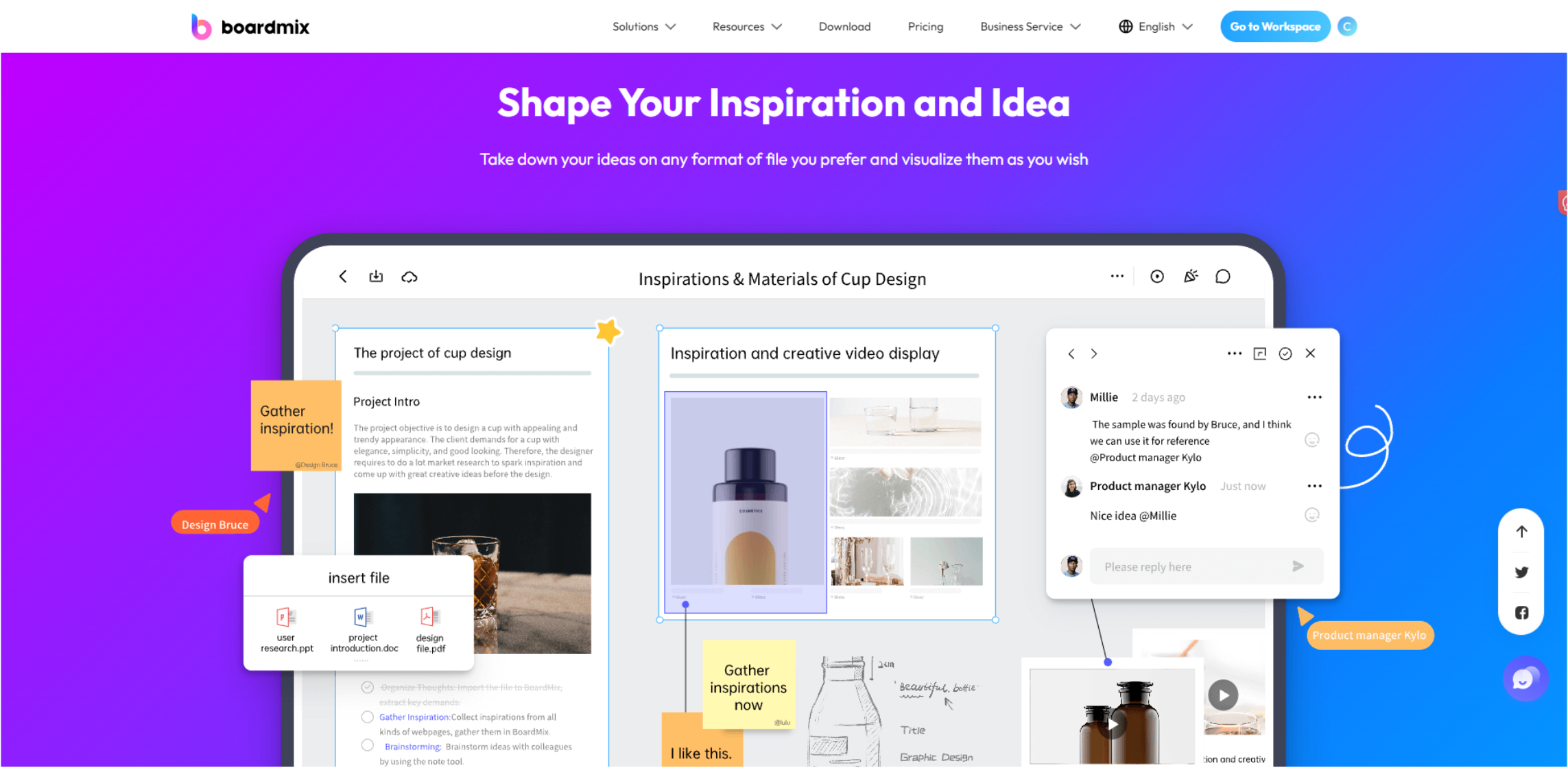
By leveraging these features, Boardmix offers an effective platform for conducting comprehensive PESTLE analyses. Whether you're brainstorming in real time with your team, integrating multimedia elements for deeper insights, or leveraging AI for idea generation, Boardmix's dynamic environment makes the strategic planning process more efficient and collaborative.To ease the task, you can take use of a one-stop tool called Boardmix. Just give it a try!











